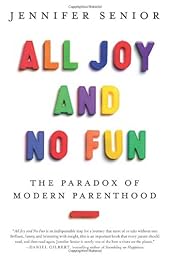
|
All Joy and No Fun: The Paradox of Modern Parenthood
|
||||||||||||||||||||
Buying Choices |
| 38 new from $14.97 |
| 14 used from $15.19 |
(as of 2014-02-03 20:00:13 PST)
Description
Thousands of books have examined the effects of parents on their children. In All Joy and No Fun, award-winning journalist Jennifer Senior now asks: what are the effects of children on their parents?
In All Joy and No Fun, award-winning journalist Jennifer Senior tries to tackle this question, isolating and analyzing the many ways in which children reshape their parents' lives, whether it's their marriages, their jobs, their habits, their hobbies, their friendships, or their internal senses of self. She argues that changes in the last half century have radically altered the roles of today's mothers and fathers, making their mandates at once more complex and far less clear.
Recruiting from a wide variety of sources—in history, sociology, economics, psychology, philosophy, and anthropology—she dissects both the timeless strains of parenting and the ones that are brand new, and then brings her research to life in the homes of ordinary parents around the country. The result is an unforgettable series of family portraits, starting with parents of young children and progressing to parents of teens. Through lively and accessible storytelling, Senior follows these mothers and fathers as they wrestle with some of parenthood's deepest vexations—and luxuriate in some of its finest rewards.
Meticulously researched yet imbued with emotional intelligence, All Joy and No Fun makes us reconsider some of our culture's most basic beliefs about parenthood, all while illuminating the profound ways children deepen and add purpose to our lives. By focusing on parenthood, rather than parenting, the book is original and essential reading for mothers and fathers of today—and tomorrow.
| Check All Offers | Add to WishList | Customer Reviews | Trade-In List |
Editoral Review
Author One-on-One: Jennifer Senior and Curtis Sittenfeld


Curtis Sittenfeld is the best-selling author of Sisterland and American Wife.
Curtis Sittenfeld: As a journalist, you’ve written about a wide range of topics, including pop culture and politics, so I’m wondering why parenthood is the subject that elicited a book from you.
Jennifer Senior: You’re right, and if this were a parenting book, it wouldn’t even occupy the same hemisphere as the other pieces I’ve done. (Confession: I have purchased exactly one parenting book in my lifetime.) But I consider this a social science book, and I’ve done plenty of social science stories over the years: About the psychological effects of high school on our adult years; about loneliness and cities; about burnout; about our obsession with happiness. Also, I think of this book as a series of mini-ethnographies—portraits of how American families live now—and that comes pretty naturally, having been an anthro major. Even when I wrote about the Senate, which used to be often, I treated it as an other-planetary universe with its own alien customs.
CS: This book has its origins in a much-buzzed-about New York magazine cover story. In that article but not in the book, you discussed your own experiences as a parent. Why didn’t you include yourself in the book? Can you share a bit about your family?
JS: So funny: I mentioned my own experience in just two paragraphs of that magazine story, but because they were the first two paragraphs, people misremember it as part-memoir. The only reason I did so – both early in the magazine story and in this book — was to alert readers that I, too, was a parent. But the specifics of my own story seem irrelevant, and too idiosyncratic from which to generalize. It’s far better to look at the full spectrum of social science research about families, and to talk to a wide variety of parents.
For the record, though: My husband and I have one six-year-old son, and my husband has two grown kids from a previous marriage. I entered their lives when they were adolescents, which made me realize how complicated that period was for parents.
CS: One of the book’s fascinating tidbits is the implication that parents have friction with teens in some sense because the parents are jealous.
JS: Jealousy is only a small part of it. (Though I’m amazed by Laurence Steinberg’s finding that fathers become depressed when their teenage sons start to date.) What generally seems to happen is that adolescents make their parents take stock of every life choice they’ve ever made—their marriages and careers especially. Teenagers can be so critical and rejecting that they expose all the holes in their parents’ lives: Now that my kid’s dispensed with me, all I have is my marriage and my job, and I’m not thrilled with either.
CS:In your marriage chapter, you suggest at one point that many moms would be better off being more like dads. Can you explain what you mean?
JS:I only mean this in the sense that fathers seem less frantically perfectionist about their parenting than mothers do, probably because they aren’t burdened by the same unattainable cultural ideals (real or fictional—Tiger Mom or June Cleaver.) It’s a crude generalization, yes, and of course there are exceptions. But both conversations and hard data make it clear that fathers feel much less pressure to play with their children during every free moment, and they’re much quicker to claim their right to free time. If mothers did the same, one wonders what would happen—Glad you’re back from that bike ride, now I’m going to the gym! It’s possible domestic divisions of labor would shift a little in their favor.
Book Details | ||||
| Author: Jennifer Senior | Publisher: Ecco | Binding: Hardcover | Language: English | Pages: 320 |
Comments |
Become a fan of Book Presence on Facebook for the inside scoop on latest and most exclusive books.





